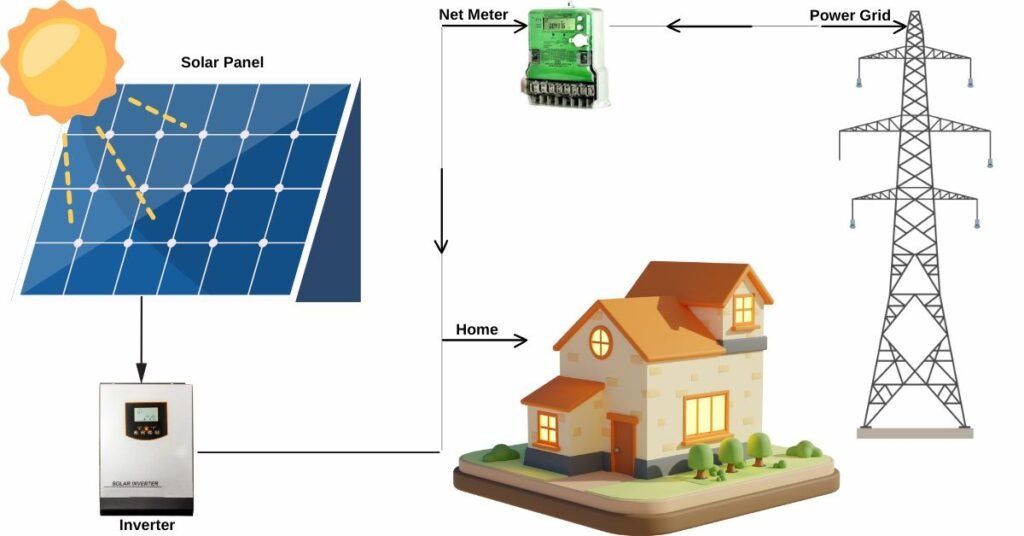In this blog, we’ll explain everything about on grid solar systems in Pakistan in a simple way. You’ll learn how they work, how much they cost, and why they’re a great choice—so you can decide if going solar is right for you!
On Grid Solar System: The Ultimate Guide to Affordable and Sustainable Energy
In the blog, we explore how an on grid solar system in Pakistan can help you save money on electricity bills, earn net metering credits, and reduce your carbon footprint. Discover the cost, benefits, and installation process to make a smart switch to solar energy today! For more information, visit here.
What is an On Grid Solar System?
An on grid solar system connects to the main electricity grid. It produces electricity from the sun during the day. If you make extra energy, it goes back to the grid, and you get credits (called net metering). At night, when the sun isn’t shining, you can use electricity from the grid.
No batteries needed – saves money
Sells extra electricity – earns you credits
Works with the main grid – no blackouts
How Much Does It Cost in Pakistan?
The price of an on grid solar system in Pakistan depends on how much electricity you need. Here’s a simple cost breakdown:
| System Size | Average Cost (PKR) | Monthly Bill Savings |
|---|---|---|
| 5 kW | 750,000 – 900,000 | Up to 20,000 |
| 10 kW | 1,400,000 – 1,700,000 | Up to 40,000 |
| 15 kW | 2,000,000 – 2,500,000 | Up to 60,000 |
Larger systems = More savings
Government incentives make it even cheaper

Why Choose an On Grid Solar System?
Still not sure if solar is the right choice? Here are 5 powerful reasons to go for it:
Save Money – No more high electricity bills!
Earn Credits – Sell extra power to the grid.
No Batteries Needed – No extra costs or maintenance.
Eco-Friendly – Reduce pollution and help the planet.
Increase Property Value – Homes with solar panels are worth more!
FAQs – Your Questions Answered!
1. How does net metering work?
Net metering lets you sell extra electricity to the grid. Your electric meter runs backward, and you get credits on your bill. This means lower or zero electricity bills each month!
2. Does weather affect solar panels?
Yes, but solar panels still work in different weather conditions:
Sunny Days – Best performance!
Cloudy Days – Works, but less power (10-25% drop).
Rainy Days – Helps clean panels but reduces output.
Snowy Days – Works in cold weather but needs cleaning if covered.
3. How long do solar panels last?
Solar panels are built to last 25-30 years! Inverters last about 10-15 years before needing a replacement. With proper care, your system will run smoothly for decades.
4. How much space do I need for solar panels?
Here’s a quick guide on roof space needed:
| System Size | Roof Space Needed |
|---|---|
| 5 kW | 350-400 sq. ft. |
| 10 kW | 700-800 sq. ft. |
| 25 kW | 1,800-2,000 sq. ft. |
Tip: High-efficiency panels need less space for the same output!
5. Can I expand my system later?
Yes! You can add more panels if your electricity needs increase. Just make sure your inverter can handle the extra power.
On-Grid vs. Off-Grid vs. Hybrid Solar – What’s the Difference?
| Feature | On-Grid | Off-Grid | Hybrid |
|---|---|---|---|
| Grid Connection | ✅ Yes | ❌ No | ✅ Yes |
| Batteries | ❌ No | ✅ Yes | ✅ Optional |
| Net Metering | ✅ Yes | ❌ No | 🟡 Limited |
| Backup Power | ❌ No | ✅ Yes | ✅ Yes |
| Cost | 💰 Lower | 💰💰 Higher | 💰💰 Moderate |
Best for you if: You live in a city with reliable electricity and want to cut down bills.
The Future of Solar Energy in Pakistan
Pakistan is moving fast toward solar energy because:
Government incentives make solar cheaper.
Electricity prices are rising, making solar a smart investment.
Solar helps fight pollution and protects the environment.
With the Alternative Energy Development Board (AEDB) and NEPRA supporting solar, now is the best time to switch to solar!
Take Action – Go Solar Today!
If you’re thinking about installing an on-grid solar system in Pakistan, don’t wait! You can:
Lower your electricity bills
Earn credits with net metering
Help the environment
